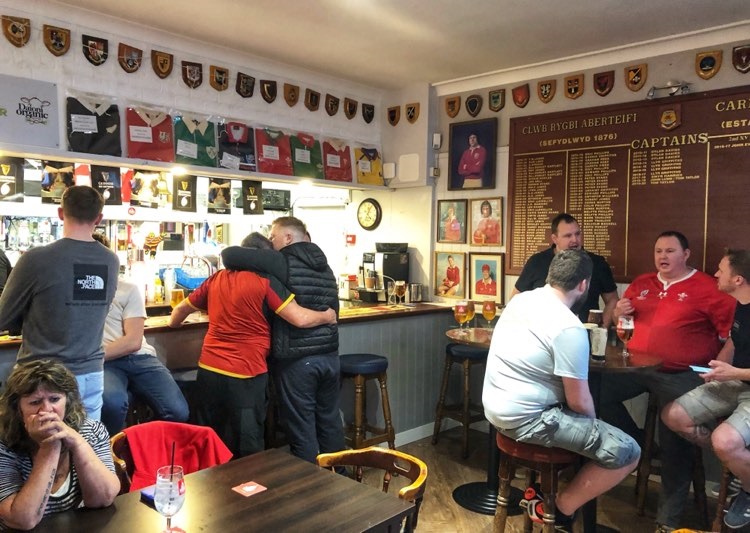Ben Wildsmith watches the resurrection of Wales Six Nation hopes in ‘Dead Man’s Corner’

Ben Wildsmith
Wales 20-17 Scotland
The Wetherspoon’s on Cardiff’s City Road, in an act of conspicuous cultural sensitivity, was offering a special of haggis, neeps and tatties as Scottish supporters began to arrive on Thursday night. Well, it’s what they like, isn’t it?
What they very much don’t like is the effect on a rugby team that Dan Biggar can have when he feels that it isn’t operating at the level he demands. Yesterday’s victory was led from the front and, it is safe to assume, built upon a week’s leadership in training that reflected Biggar’s personal standards. After last week’s debacle in Dublin, his 100 cap was going one of two ways but, dragging a knee injury sustained early on, he seemed to infuse his team with the will to endure all that Scotland could throw at them.
Having misunderstood the news and being under the impression that 130 000 Russian troops were advancing westwards from Sebastopol near Pontypool, Mrs. Wildsmith and I fled Cardiff and watched the game from the relative safety of Cardigan RFC. Arriving early, we were soon joined at our table by the genial triumvirate of Eric, Hayden and Denzil: gentlemen of sufficient seniority to have been present when Delme and the boys beat the All Blacks at Stradey Park in 1972.
‘There used to be eight of us sat here,’ Eric recalled. ‘You’re sitting in Dead Man’s Corner…’
And in the lead up to the game, it did feel distinctly funereal. Denzil was only here because the club’s no-swearing rule guaranteed better prospects for his eternal soul than had he been watching at home.
Nervy
I don’t know about you, but Scotland is always a nervy game for me. Ireland is the litmus test: objectively they are our equals so that one can go either way every year. France are, to put it delicately, unpredictable: the right décor in the changing rooms might cause them to defeat the All Blacks, having lost to Tonga the week before, why bookies offer odds on them is a mystery. The England game has nothing to do with sport at all, at least for us, and occupies the emotional space generally taken up by births and deaths. A loss to Scotland, however, usually means that we will be scrapping it out for the wooden spoon. In days gone by, before Carwyn James sprinkled his genius over Italy, it meant worse than that. This Scotland side were looking to build on back-to-back Calcutta Cup victories and supplant Wales in the European pecking order properly.
14-14 at half time.
‘Don’t fill up on nuts,’ Eric advised, ‘they’re bringing out free sausages and chips!’
Behind the bar there are beautifully preserved jerseys displayed. The barman caught me admiring Brynmor Williams’ Cardiff RFC centenary shirt.
‘He’s my uncle, used to play here.’
‘I played hooker with him,’ the fellow next to me confirmed.
‘Funny thing, he never captained this club, his brother did though.’
‘Right enough.’
Hope remained in short supply as the second half kicked off.
‘We’re having a great afternoon, if we lose, we lose,’ the triumvirate agreed.
And when Scotland posted the first points of the second half, that prospect seemed all too likely. But this wasn’t the Wales of last week.
‘Where’s the intensity?’ Biggar had implored the team in Dublin. Today, they had rediscovered it, and no breakdown was conceded without a fight. With the crowd in full voice, almighty scraps for the ball took place around the half-way line as the closely matched sides tucked into the meat of the game.

‘Ireland are a class above, that’s what we’re learning here,’ warned Hayden, lugubriously, but you can only play who’s in front of you and as the half played out, it became clear that Wales weren’t going to fold this time. Finally, the Scots began to give a little, and Wales were able to mount a sustained attack on their line with 10 minutes left. With a penalty already awarded, Biggar opted to drop a goal, rather than take a place kick or press for the line. It seemed a strange decision, we were puzzled by it in Cardigan.
The next ten minutes proved him right. The captain had handed Scotland the ball and invited them to attack Wales’s 3-point lead. In doing so, he placed faith in a team that had been written off and derided all week and gave them the opportunity to redeem themselves. At 78 minutes, with a penalty awarded, Biggar’s limp had worsened to the point he was substituted. Tellingly, he refused to leave the field until he’d found touch. From the sidelines, he had to watch Wales defend 10 phases of play with 80 minutes up. He’d shown them what they were about, though and he wasn’t disappointed.
We’ve seen prettier Welsh victories, but this one held genuine significance. What looked last week like the inevitable consequence of a failing system was reversed by the determination of a team that wouldn’t accept that narrative.
The triumvirate looked 10 years younger as we left Dead Man’s Corner.
Support our Nation today
For the price of a cup of coffee a month you can help us create an independent, not-for-profit, national news service for the people of Wales, by the people of Wales.





I cant disagree with a single word of that analysis of a fascinating match.
Can’t imagine why anyone would go to a Wetherspoons apart from students because it is cheap and alcoholics for the same reason
We won, weatherspoons or not. Ben Wildesmith , Thank you for your analysis.